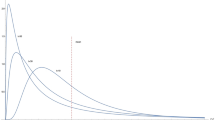Abstract
A feature of the sustainability problem is that the preferences of future generations are uncertain. In this paper, we put forward a fairness-based definition of sustainability that takes this uncertainty into account. We analyze the implications of this definition in the context of a model of project evaluation. We show that our definition encompasses the concepts of non-declining welfare and of weak and strong sustainability. Furthermore, we show that preference uncertainty has a substantial influence on the implications of sustainability.
Similar content being viewed by others
References
K. J. Arrow A. C. Fisher (1974) ArticleTitle‘Environmental Preservation, Uncertainty, and Irreversibility’ Quarterly Journal of Economics 88 312–319
G. B. Asheim K. A. Brekke (2002) ArticleTitle‘Sustainability when Capital Management has Stochastic Consequences’ Social Choice and Welfare 19 921–940 Occurrence Handle10.1007/s003550200188
A. Ayong Le Kama (2001) ArticleTitle‘Preservation and Uncertain Future Preferences’ Economic Theory 8 745–752
A. Ayong Le Kama K. Schubert (2004) ArticleTitle‘Growth, Environment and Uncertain Future Preferences’ Environmental and Resource Economics 28 31–53 Occurrence Handle10.1023/B:EARE.0000023820.15522.a4
Cornia, G. A. and F. Stewart (1995), ‘Two Errors of Targeting’, in D. van de Walle and K. Nead, eds., Public Spending and the Poor: Theory and Evidence. John Hopkins University Press.
T. E. Daniel (1975) ArticleTitle‘A Revised Concept of Distributional Equity’ Journal of Economic Theory 11 94–109 Occurrence Handle10.1016/0022-0531(75)90041-1
A. C. Fisher J. V. Krutilla (1974) ArticleTitle‘Valuing Long-Run Ecological Consequences and Irreversibilities’ Journal of Environmental Economics and Management 1 96–108 Occurrence Handle10.1016/0095-0696(74)90007-2
M. C. Gutès (1996) ArticleTitle‘The Concept of Weak Sustainability’ Ecological Economics 17 147–157
Heal, G. M., G. Chichilnisky and A. Beltratti (1998), ‘Uncertain Future Preferences and Conservation’, in G. Chichilnisky and A. Vercelli, eds., Sustainability: Dynamics and Uncertainty, Kluwer Academic Publishers.
R. E. Howe (1987) ArticleTitle‘Sections and Extensions of Concave Functions’ Journal of Mathematical Economics 16 53–64 Occurrence Handle10.1016/0304-4068(87)90021-8
R. A. Naga (2003) ArticleTitle‘The Allocation of Benefits under Uncertainty: A Decision Theoretic Framework’ Economic Modelling 20 873–893
J. C. V. Pezzey (1992) Sustainable Development Concepts: An Economic Analysis, Environment Paper 2 World Bank Washington, DC
J. E. Roemer (1996) Theories of Distributive Justice Harvard University Press Cambridge, MA
Sen, A. K. (1995). ‘The Political Economy of Targeting’, in D. van de Walle and K. Nead, eds., Public Spending and the Poor: Theory and Evidence, John Hopkins University Press.
H. R. Varian (1974) ArticleTitle‘Equity, Envy, and Efficiency’ Journal of Economic Theory 9 63–91 Occurrence Handle10.1016/0022-0531(74)90075-1
R. T. Woodward (2000) ArticleTitle‘Sustainability as Intergenerational Fairness: Efficiency, Uncertainty, and Numerical Methods’ American Journal of Agricultural Economics 82 581–593 Occurrence Handle10.1111/0002-9092.00048
Author information
Authors and Affiliations
Corresponding author
Additional information
We are indebted to two anonymous referees whose comments helped considerably to improve the paper. All remaining errors are ours.
Rights and permissions
About this article
Cite this article
Krysiak, F.C., Krysiak, D. Sustainability with Uncertain Future Preferences. Environ Resource Econ 33, 511–531 (2006). https://doi.org/10.1007/s10640-005-0004-6
Accepted:
Issue Date:
DOI: https://doi.org/10.1007/s10640-005-0004-6




